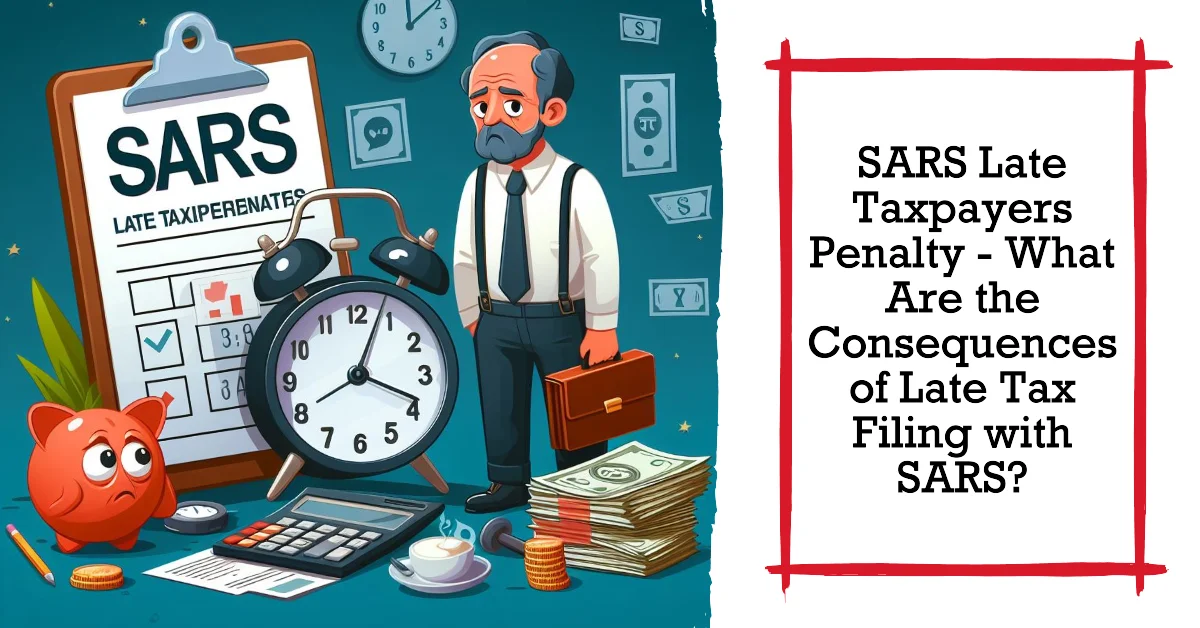For Advertising Contact Us
SARS Late Taxpayers Penalty – What Are the Consequences of Late Tax Filing with SARS?

Consequences of failing to submit your tax returns on time can have serious financial implications and legal ramifications. The South African Revenue Service (SARS) enforces penalties for late tax filing, and understanding these consequences is crucial for every taxpayer. Late filers may face financial penalties, interest charges on outstanding amounts, and even legal action. In this blog post, we will explore the potential consequences of late tax filing with SARS, highlighting the importance of meeting tax deadlines and fulfilling your obligations as a taxpayer.
Understanding Late Tax Filing
Definition of Late Filing with SARS
The South African Revenue Service (SARS) requires taxpayers to submit their tax returns by a specified deadline each year. Late filing occurs when a taxpayer fails to submit their tax return by the due date set by SARS. This can result in penalties and consequences for the taxpayer.
Common Reasons for Late Filing
Understanding the common reasons for late tax filing with SARS is crucial in order to avoid penalties and repercussions. Some of the common reasons for late filing include procrastination, lack of necessary documentation, changes in personal circumstances, and simply forgetting about the deadline. It is important for taxpayers to be aware of these reasons and take preventative measures to ensure timely submission of their tax returns.
To avoid the consequences of late tax filing with SARS, taxpayers must familiarize themselves with the definition of late filing, be mindful of common reasons for late submission, and take proactive steps to ensure compliance with tax deadlines. By understanding these key aspects, taxpayers can avoid unnecessary penalties and maintain a good standing with SARS.
Penalties for Late Tax Filing
Financial Implications
Financial discipline is crucial when it comes to filing your taxes on time. Failure to do so may result in penalties imposed by the South African Revenue Service (SARS), which can add up quickly and significantly impact your finances. These penalties are calculated based on the amount of tax owed and the number of days overdue.
Legal Consequences
Late submission of tax returns to SARS can lead to legal consequences that should not be taken lightly. SARS has the authority to impose penalties, prosecution, or legal action against taxpayers who consistently fail to comply with tax filing deadlines. Resolving these legal issues can be complex and time-consuming, often requiring the assistance of a professional tax advisor or legal expert.
Interest can also accumulate on any outstanding tax amounts, increasing the overall sum owed to SARS. It is crucial to address any outstanding tax liabilities promptly to avoid further financial strain and potential legal repercussions.
How to Avoid Late Filing Penalties
Filing Tax Returns Early
An effective way to avoid late filing penalties with SARS is to file your tax returns early. This gives you ample time to gather all necessary documentation, review your financial records, and ensure accuracy in your filings.
Seeking Professional Assistance
For individuals or businesses with complex financial situations, seeking professional assistance from a tax consultant or accountant can greatly help in avoiding late filing penalties. These professionals have the expertise to navigate SARS requirements, identify potential deductions, and optimize your tax returns to minimize any penalties.
Understanding the intricacies of tax laws and regulations can be overwhelming. A tax professional can provide personalized guidance, keep you updated on any changes in tax legislation, and assist in submitting your returns accurately and on time.
Remedial Actions for Late Taxpayers
Steps to Mitigate Penalties
Taxpayers who are facing late filing penalties with the South African Revenue Service (SARS) can take proactive steps to mitigate these penalties. One of the key strategies is to file all outstanding tax returns as soon as possible. By doing so, taxpayers can demonstrate their willingness to comply with their tax obligations and reduce the impact of penalties imposed by SARS.
Negotiating with SARS
Late taxpayers can consider negotiating with SARS to minimize the financial impact of late filing penalties. It is imperative for taxpayers to communicate openly and transparently with SARS regarding their reasons for late filing and their efforts to rectify the situation. By engaging in constructive dialogue with SARS, taxpayers may be able to reach a mutually beneficial resolution that reduces the overall penalties imposed.
Compliance Tips for Taxpayers
To avoid late tax filing penalties with SARS, taxpayers need to ensure compliance with tax laws and regulations. Here are some imperative tips to help taxpayers stay on track:
- Make sure to file your tax returns on time.
- Keep accurate records of all income and expenses.
- Plan ahead for tax payments to avoid any financial strain.
Any deviation from the tax regulations set by SARS could result in penalties and interest charges being imposed on late taxpayers.
SARS Deadlines and Requirements
To ensure compliance with SARS regulations, taxpayers must be aware of all deadlines and requirements set by the tax authority. Failure to meet these deadlines can result in penalties and interest charges being levied.
Record Keeping and Tax Planning
The key to minimizing tax liabilities and avoiding penalties is effective record keeping and tax planning. By maintaining accurate records of income and expenses, taxpayers can easily file their tax returns on time and plan for any tax payments due. Proper tax planning can also help taxpayers take advantage of any tax incentives or deductions available to them, ultimately reducing their tax burden.
Conclusion
Taking this into account, it is crucial for taxpayers to adhere to the deadlines set by the South African Revenue Service (SARS) to avoid facing penalties for late tax filing. The consequences of missing the deadline can result in hefty fines, interest charges, and even legal action. It is important for individuals and businesses to prioritize their tax obligations and ensure timely submission of accurate tax returns to avoid any negative implications on their financial standing and compliance with tax laws.



